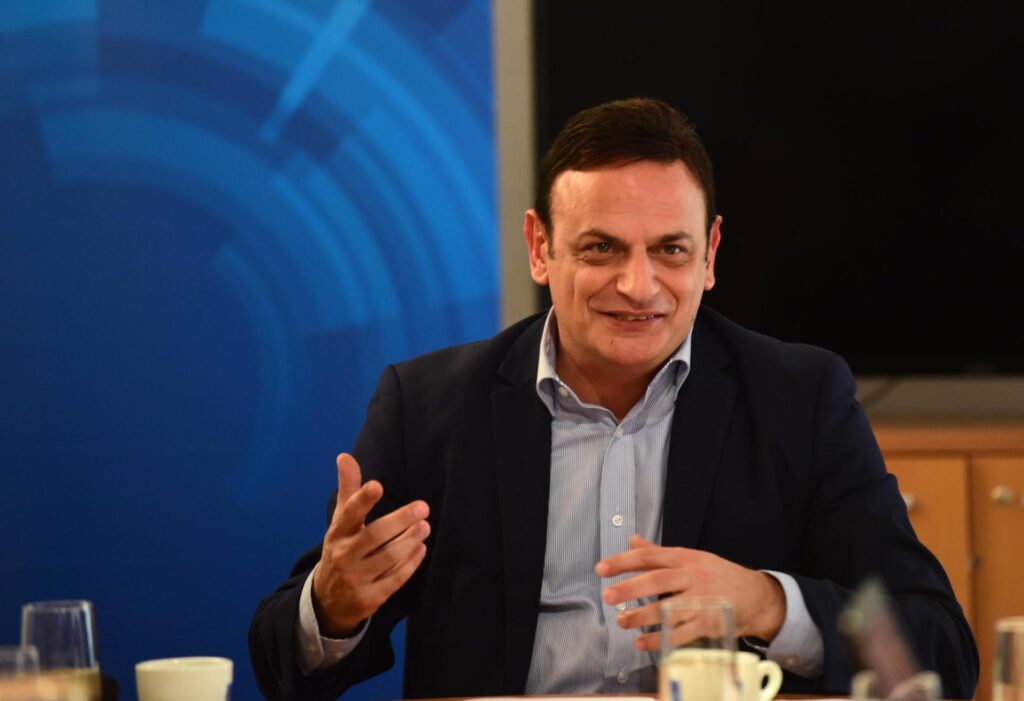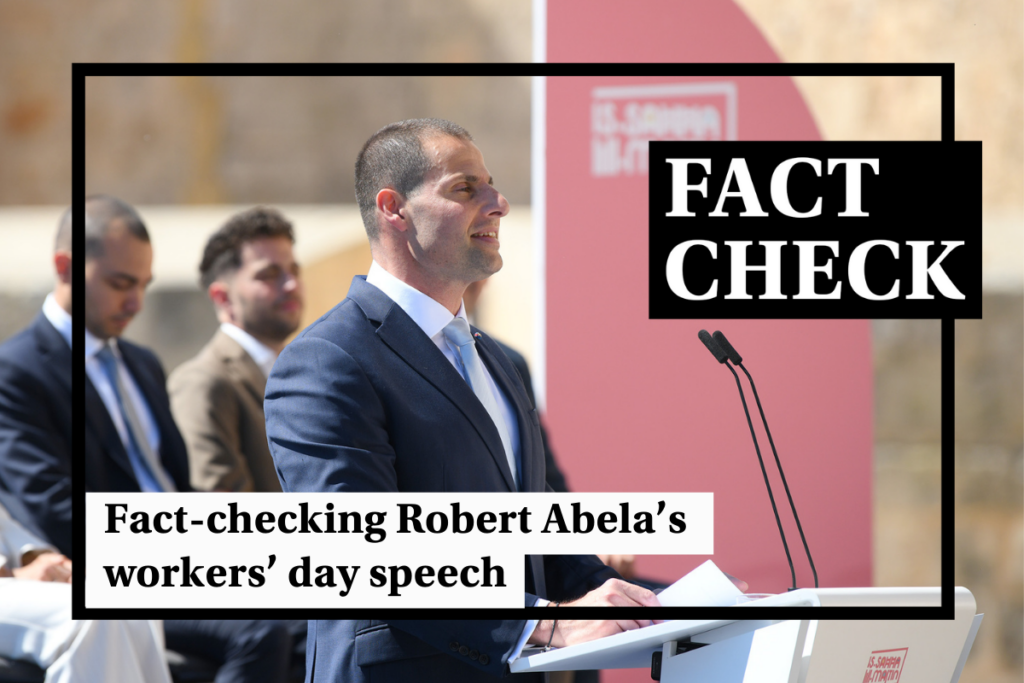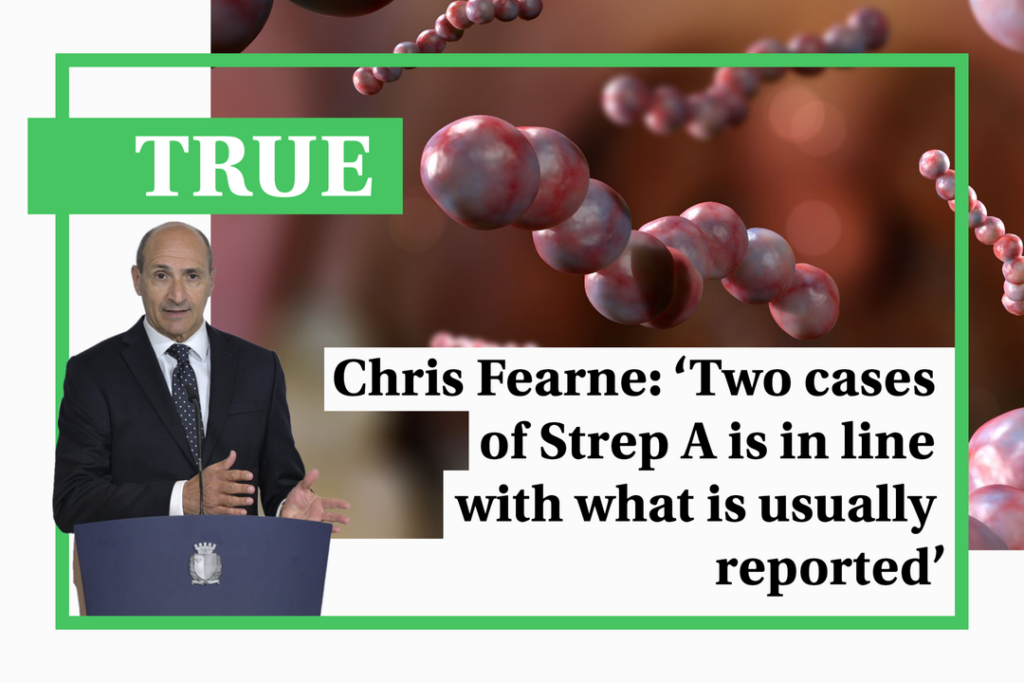Prime Minister and Labour Party leader Robert Abela launched his party’s European Parliament election campaign with a fiery speech at a May Day rally.
Times of Malta dug through several claims made by Abela during his speech to separate fact from fiction.
Claim: Roberta Metsola called Lawrence Gonzi “my prime minister”.
Without referring to Metsola by name, Abela told the crowd “we heard her – you know who – just a few days ago say ‘this is my prime minister’, about he who the Maltese people voted out with all its might”.
Abela is referring to a clip that made the rounds in recent days of European Parliament President (and Nationalist Party MEP) Roberta Metsola introducing former PM Lawrence Gonzi as “my prime minister” to European Commission President Ursula von der Leyen.
But Abela failed to mention the context in which Metsola’s comment was made.
Gonzi was attending a ceremony at the EP to celebrate the 20th anniversary of the EU’s enlargement. Aside from Gonzi, the then-prime ministers of the other nine EU countries that joined the EU in 2004 also attended the ceremony.
The full video of the interaction shows all the former prime ministers queuing to greet and exchange pleasantries with von der Leyen before the ceremony started. When it comes to Gonzi’s turn, Metsola leans forward and says “this is my prime minister”.
Although it is true that Metsola referred to Gonzi as “my prime minister”, the context of the encounter makes it clear that she meant that he was Malta’s prime minister at the time of the EU’s 2004 enlargement, not her current prime minister.
Verdict: Misleading.
Claim: PN MEPs are trying to block Malta from getting EU funding
In his speech, Abela argued that PN MEPs “have tried, and are still trying, to deny Malta EU funding”.
It is likely that Abela is referring to one of the thorniest discussions taking place across the EU, namely that known as rule of law conditionality. In simple terms, this means that countries which are deemed not to respect the rule of law are sanctioned or blocked from receiving EU funding.
All 27 EU member states had signed up to a broad agreement on the issue back in late 2020 but, as the Jacques Delors Institute notes, the agreement used “deliberately ambiguous” terms to get all countries to sign up.
All six of Malta’s MEPs, including PL’s three representatives, had voted in favour of a resolution on the issue when it came to be voted on in the EP in March 2021.
Things are a little tricker now that it’s time to fill in the gaps and agree on how and why the EU can block or suspend EU funding, with the issue even finding its way to the European Court of Justice.
Some PL MEPs have argued that the EP risks overstepping its role by not adopting a transparent and independent methodology by which rule of law breaches are assessed, instead giving too much weight to political manoeuvring.
Last October, PN MEP David Casa wrote to EC President Ursula von der Leyen urging her to use the conditionality mechanism in the wake of benefits racket.

In reply, PL argued, as it had already done previously, that PN MEPs are deliberately tarnishing Malta’s name, to stop Malta from receiving EU funding.
Verdict: Misleading. While it’s true that Casa called on the EU to use its conditionality mechanism, Maltese MEPs from both parties supported the mechanism’s introduction in principle.
Claim: Malta used up 100% of its EU funding
Abela has made this claim previously, and EU data suggests that he is correct.
The EU’s funding is granted in seven-year blocs, although the use of these funds often spills over beyond the seven years. Malta was awarded some €1.2b in structural and investment funds for the 2014-2020 period and had spent all of it by 2023.
This doesn’t mean that Malta’s spending went entirely to plan. While it had planned to spend some €196m in agricultural funds, it only ended up using a third of that (€131.5m). It also spent less than anticipated on maritime funds (€21m, rather than the planned €29m).
Nevertheless, Malta made up for this by spending far more than expected on social funds (€414m, rather than €279m) and on infrastructural development (€486m instead of €464m).
Malta is one of seven EU countries to successfully hoover up its entire share of EU funding throughout this period. Nonetheless, the majority of countries used up over 90% of their funds, with only few outliers spending far less than what they had initially planned.
Verdict: True, but Malta spent less than planned in some sectors and more than planned in others.


